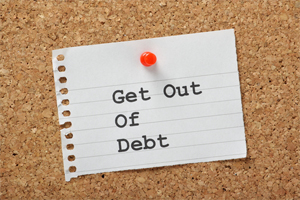Debt is a burden that can be hard to get rid of. It often requires some sacrifice as you spend less on luxuries so you can pay off what you owe. Yet debt doesn’t have to be something haunting you for the rest of your life. Here are some tips to getting debt-free.
1. Create a plan
Write a list of all your debts and order them by their interest rate. The amount with the highest interest rate should be your first target debt to pay off. On most of your other owing balances you’ll want to be paying at least the minimum off so you don’t get hit with late repayment fees. Work out how much this will cost you each month and create yourself a budget, cutting out as many non-essential expenses as you can. Try to set yourself goals with this budget to help you stay focused and change any bad spending habits you have.
2. Source some funds
You want to get any debt paid off as soon as possible. The longer you are repaying an amount you borrowed, the more you are giving the lender through the interest rate. Try to avoid just paying the minimum and increase your monthly payments as much as possible. If you have savings invest them in eliminating your debt. Another option is to take a loan from family or a friend. Just be clear on the terms of your repayment of the loan and create a written agreement.
3. Consolidate your debt
If you would prefer not to test your relationships, it might be worth borrowing from a registered lender to pay off a number of outstanding balances. This is one way to consolidate your debt and make things easier to keep track of. Just make sure the loan you take out or credit card you transfer your debt to has a lower interest rate than your current debts. Be wary of some low interest rate credit card offers, as the rate may only be applicable for a short period of time before you get hit with a higher rate. It might be worth getting a personal loan instead, especially with a fixed interest rate.
4. Renegotiate your debt
Sometimes no matter cuts you make to your budget, you still will struggle and fail to meet your repayments. If you are getting to the point of filing for bankruptcy, it’s best to talk to your creditors first. Let them know about your financial situation and see if you can negotiate a lower interest rate or other payment plan. Most lenders would rather be partially paid back for the amount you borrowed than not at all.
Once you’ve pulled yourself out of the hole that debt put you in, try to avoid falling back in. This means keeping track of your finances and remembering that what you borrow needs to be paid back. Don’t let credit accumulate until it is hard to manage, but do your best to develop good money habits.


